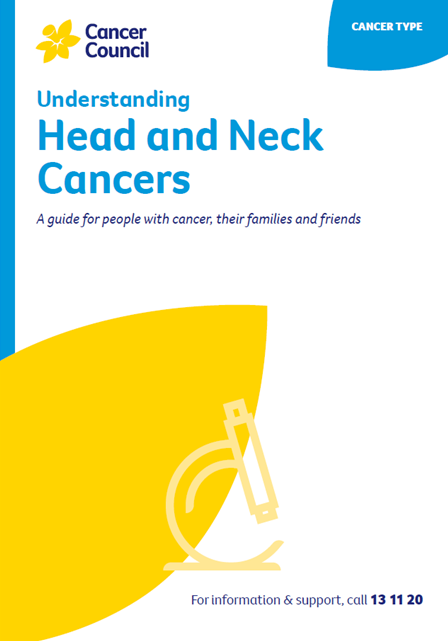- Home
- Head and neck cancers
- Diagnosis
- Your health care team
Your health care team
Your GP will arrange the first tests to assess your symptoms. If these tests do not rule out cancer, you will usually be referred to a specialist, who will arrange further tests. If head and neck cancer is diagnosed, the specialist will consider treatment options. Often these will be discussed with other health professionals at what is known as a multidisciplinary team (MDT) meeting.
During and after your treatment, you will see a range of health professionals who specialise in different aspects of your care. It’s recommended that complex head and neck cancer is treated in a specialist centre. If you have to travel a long way for treatment, transport and accommodation assistance may be available to you. Call Cancer Council on 13 11 20 for details.
Health professionals you may see
| ENT (ear, nose and throat) specialist | treats disorders of the ear, nose and throat |
| head and neck surgeon | diagnoses and treats cancers of the head and neck; may be an ENT, general, plastic, or oral and maxillofacial surgeon |
| oral (maxillofacial surgeon) | performs surgery and treats disorders of the mouth, face and jaws |
| reconstructive (plastic) surgeon | performs surgery that restores, repairs or reconstructs the body’s appearance and function |
| dentist | evaluates and treats the teeth, which can be affected by cancer treatment |
| oral medicine specialist | evaluates and treats the mouth, face, jaw and salivary glands, which can be affected by cancer treatment |
| radiation oncologist | treats cancer by prescribing and overseeing a course of radiation therapy |
| medical oncologist | treats cancer with drug therapies such as chemotherapy, targeted therapy and immunotherapy (systemic treatment) |
| cancer care coordinator | coordinates your care, liaises with MDT members, and supports you throughout treatment; may be a clinical nurse consultant (CNC) or clinical nurse specialist (CNS) |
| nurse | administers drugs and provides care, information and support throughout treatment |
| speech pathologist | evaluates and treats communication, voice and swallowing difficulties during and after treatment |
| dietitian | helps with nutrition concerns and recommends changes to diet during treatment and recovery |
| social worker | links you and your family to support services and helps with emotional, practical and financial issues |
| counsellor, psychologist | help you manage your emotional response to diagnosis and treatment |
| physiotherapist, exercise physiologist | help restore movement and mobility, and improve fitness and wellbeing; physiotherapists also help with breathing and airway clearance and managing lymphoedema |
| occupational therapist | assists in adapting your living and working environment to help you resume usual activities after treatment |
| Aboriginal and Torres Strait Islander liaison officer | supports Aboriginal and Torres Strait Islander people and their families during treatment and recovery |
| pharmacist | dispenses medicine and gives advice about medicines, doses and possible side effects or interactions with other drug |
→ READ MORE: Head and neck cancer treatment
Podcast for people affected by cancer
Listen now
A/Prof Martin Batstone, Oral and Maxillofacial Surgeon and Director of the Maxillofacial Unit, Royal Brisbane and Women’s Hospital, QLD; Polly Baldwin, 13 11 20 Consultant, Cancer Council SA; Martin Boyle, Consumer; Dr Teresa Brown, Assistant Director Dietetics, Royal Brisbane and Women’s Hospital, Honorary Associate Professor, University of Queensland, QLD; Dr Hayley Dixon, Head, Clinical Support Dentistry Department, WSLHD Oral Health Services, Public Health Dentistry Specialist, NSW; Head and Neck Cancer Care Nursing Team, Royal Melbourne Hospital, VIC; Rhys Hughes, Senior Speech Pathologist, Peter MacCallum Cancer Centre, VIC; Dr Annette Lim, Medical Oncologist and Clinician Researcher – Head and Neck and Non-melanoma Skin Cancer, Peter MacCallum Cancer Centre, VIC; Dr Sweet Ping Ng, Radiation Oncologist, Austin Health, VIC; Deb Pickersgill, Senior Clinical Exercise Physiologist, Queensland Sports Medicine Centre, QLD; John Spurr, Consumer; Kate Woodhead, Physiotherapist, St Vincent’s Health, Melbourne, VIC; A/Prof Sue-Ching Yeoh, Oral Medicine Specialist, University of Sydney, Sydney Oral Medicine, Royal Prince Alfred Hospital, Chris O’Brien Lifehouse, NSW.
View the Cancer Council NSW editorial policy.
View all publications or call 13 11 20 for free printed copies.


